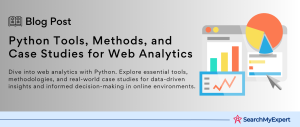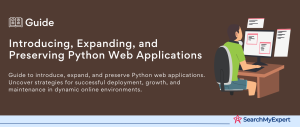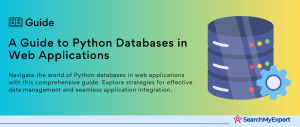Python and Cloud Services in Web Development: An Innovative Synergy
Python’s Rise in Web Development
Python, a versatile and powerful programming language, has rapidly emerged as a go-to choice for web developers. Renowned for its simplicity and readability, Python enables efficient coding, making it perfect for fast-paced web development environments.
Cloud Services: Revolutionizing Web Development
In parallel, the cloud revolution is reshaping the web development landscape. Businesses increasingly favor cloud services for their scalability, security, and cost-effectiveness. This shift towards cloud-based solutions has fundamentally altered how web applications are developed, deployed, and managed.
The Synergy Between Python and Cloud Services
Combining Python’s robustness with the flexibility of cloud services creates a powerful synergy. Python’s extensive library ecosystem, including frameworks like Django and Flask, aligns seamlessly with cloud platforms, facilitating effortless development and deployment of web applications. This synergy offers developers the tools to build scalable, secure, and innovative web solutions, capitalizing on the best of both worlds.
Advantages of Using Python with Cloud Services
Scalability and Agility
Python’s integration with cloud services stands out for its scalability. Cloud platforms enable Python applications to adapt seamlessly to varying loads. This elasticity means applications can handle surges in traffic without a hitch, ensuring a smooth user experience.
Cost Efficiency
The combination of Python and cloud services spells cost efficiency. Shifting to cloud-based infrastructure reduces the need for physical hardware, slashing upfront costs. Additionally, the pay-as-you-go model of cloud services aligns perfectly with Python’s lean development approach, minimizing operational expenses.
Faster Development and Deployment
Python’s compatibility with cloud tools accelerates development and deployment cycles. Cloud services offer a range of tools that streamline testing, integration, and deployment processes. This synergy significantly cuts down the time from conception to launch, enhancing productivity.
Global Reach and Accessibility
Leveraging cloud infrastructure, Python applications can achieve global reach with ease. Cloud platforms facilitate deployment across multiple regions, ensuring high availability and reduced latency for users worldwide.
Enhanced Security and Reliability
Cloud platforms provide robust security features and fault tolerance, crucial for Python-based applications. With advanced security protocols and data redundancy, cloud services ensure the integrity and reliability of web applications, giving developers and businesses peace of mind.
Popular Cloud Services for Python Web Development
Amazon Web Services (AWS)
AWS reigns as a top choice for Python developers. Services like Lambda offer serverless computing, allowing effortless scaling and cost reduction. Elastic Beanstalk simplifies application deployment, while S3 provides reliable and scalable object storage, making it a comprehensive platform for Python applications.
Microsoft Azure
Azure caters to Python developers with its range of services. Azure App Service enables easy web app deployments, Azure Functions supports serverless architectures, and Azure Storage offers robust data storage solutions. These tools make Azure a strong contender for Python-based web development.
Google Cloud Platform (GCP)
GCP stands out with services tailored for Python developers. Google Cloud Run offers serverless container management, App Engine simplifies application deployment, and Cloud Storage provides high-performance data storage solutions, making GCP a powerful platform for Python applications.
Other Cloud Providers
DigitalOcean, Heroku, and Platform.sh are also noteworthy for Python development. They offer simplified deployment processes and tailored solutions for different application needs, providing developers with a range of options beyond the big players.
Building a Python Web App on the Cloud
Choosing the Right Cloud Service
Selecting a cloud platform for your Python web app involves several considerations:
- Service Offerings:
Ensure the platform supports Python and offers the necessary tools. - Scalability: Look for easy scalability options to accommodate growth.
- Cost:
Compare pricing models to align with your budget. - Security and Compliance:
Check for robust security features and compliance standards.
Setting Up the Development Environment
Configuring a cloud-based Python development environment involves:
- Selecting Tools and Libraries:
Choose Python-friendly tools and libraries that integrate well with your cloud platform. - Environment Setup:
Set up a virtual environment to manage dependencies. - Code Repository Integration:
Use version control systems for code management.
Deployment and Management
Deploying and managing your Python web app on the cloud requires:
- Continuous Integration/Continuous Deployment (CI/CD) Pipelines:
Automate the deployment process for efficiency. - Monitoring and Management Tools:
Utilize cloud tools for monitoring performance and managing resources. - Update and Scale:
Regularly update your app and scale resources as needed.
This guide outlines a clear path for building, deploying, and managing a Python web application in the cloud, ensuring a smooth and efficient development process.
Security Considerations for Python Web Apps in the Cloud
Shared Responsibility Model
In cloud environments, security is a shared responsibility:
- Cloud Provider:
Responsible for securing the infrastructure. - Users:
Accountable for securing the applications and data.
Understanding this model is crucial for effective security management.
Best Practices for Securing Python Apps
Securing Python web apps involves several best practices:
- Access Control:
Implement strict access controls to limit user permissions. - Data Encryption: Encrypt sensitive data, both in transit and at rest.
- Vulnerability Patching:
Regularly update and patch to fix vulnerabilities.
Cloud Platform Security Features
Different cloud providers offer unique security features for Python applications:
- AWS:
Services like AWS Identity and Access Management (IAM) and AWS Key Management Service (KMS) for enhanced security. - Azure:
Azure Security Center provides advanced threat protection. - GCP: Google Cloud Security Command Center for real-time threat detection.
These considerations ensure that Python web apps in the cloud are not only efficient and scalable but also secure and reliable.
Real-World Examples of Python and Cloud Success Stories
Netflix
- Tech Stack:
Python, AWS - Benefits:
Scalability for millions of users, robust content delivery. - Challenges: Managing vast data, ensuring seamless global streaming.
Netflix’s use of Python and AWS exemplifies handling massive traffic and data loads efficiently.
Spotify
- Tech Stack:
Python, Google Cloud - Benefits: Personalized music recommendations, efficient data processing.
- Challenges:
Handling diverse user data, maintaining fast response times.
Spotify leverages Python and Google Cloud for its innovative recommendation algorithms.
Dropbox
- Tech Stack:
Python, AWS - Benefits: Reliable file storage and sharing, easy scalability.
- Challenges: Data security, syncing files across devices.
Dropbox’s choice of Python and AWS underscores the importance of secure, scalable cloud storage solutions.
Future of Python and Cloud in Web Development
Python and cloud services have together redefined the web development landscape, offering unparalleled benefits:
- Scalability:
Effortless scaling to handle varying user loads. - Cost Efficiency:
Reduced infrastructure costs and operational expenses. - Rapid Development and Deployment:
Streamlined processes for quicker turnaround. - Global Reach:
Enhanced user experience through global deployment. - Security and Reliability:
Robust security measures and reliable hosting.
The Future is Bright
Looking ahead, this potent combination is poised to drive further innovations:
- AI and Machine Learning Integration:
Enhanced capabilities in data analysis and user experience. - Serverless Architectures: More focus on serverless computing for even greater scalability and efficiency.
- Sustainability: Emphasis on eco-friendly cloud solutions.
- Enhanced Security Protocols:
Continual improvements in cybersecurity.
Python and cloud services will undoubtedly continue to be a powerful force in web development, shaping the digital future with every line of code and cloud deployment.
Conclusion
The fusion of Python and cloud services marks a revolution in web development, offering scalability, efficiency, and innovation. This combination is set to shape the future of the web, embracing new technologies like AI, serverless computing, and enhanced security. As we move forward, Python and cloud services will continue to drive digital transformation, offering endless possibilities for developers and businesses alike.
Redefine your software development with Python Development Service Companies.
Table of Contents
Toggle






